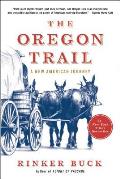
When people learn that I recently spent a long summer riding 2,000 miles across the Oregon Trail in a covered wagon pulled by mules, they invariably ask the same question: "How did the adventure change you?" Unspoken, but deep implications are embedded in that question, especially from family and friends. Maybe I have stopped drinking or lost weight. Maybe four months of camping on the plains of Wyoming and Idaho delivered me to inner peace. One of my closest friends, aware of my love of the American West, was even disappointed when I returned to live in New England. "I just figured that you'd find a little ranch out in Wyoming and settle into a completely new life," Cindy said. "It's a better ending to the story."
There were, of course, smaller changes, but these mostly just affirmed the person I was before I left. Hiking through the sage brush thickets and confusing Rocky Mountain foothills, using just a compass and a bearing on the Platte or Sweetwater rivers to find the trail ahead of me, satisfied my lifelong passion for difficult navigation challenges. I've been a reasonably competent horseman since childhood, and coaxing three mules and an unwieldy 19th-century wagon across the Western plains turned me into a much better one. I love to log in the woods and snowshoe through winter storms; I enjoy the sweet exhaustion and aching muscles delivered by a long spell outdoors. Crossing the Wyoming Rockies in 100-degree heat and incessant 40-mile-per-hour winds was just a newer, more steroidal version of that.
But there was one lasting effect that I never could have expected. Living as a wagon hobo for four months, camping in a new place every night, liberated me from the necessity of a planned, secure life, or the permanence of the same four walls and familiar surroundings. My home was on the plains, and nothing mattered to me beyond making another 30 or 35 miles toward my goal of pushing a team of mules all the way to Oregon. The journey and the spectacular landscapes were my home, and the smell of mule perspiration on leather harness, the pitting of trail dust against my unshaven face, were the sensations of my days.
After I returned, events seemed to conspire to keep me in this vagabond state. Like so many writers, I ran out of advance money and finished several of the chapters in my book about the Oregon Trail in a succession of guest houses and hunting lodges owned by friends, carrying my research around in carefully organized cardboard boxes. A documentary filmmaker from Germany needed footage of a team of mules and a covered wagon on the trail, so I moved out to Idaho for a while and did that. I would eventually finish the book at the kitchen table of my brother's farm in Maine.
During all of this, a new drama was emerging in my family. As my mother approached her 90s, it was time for her to stop driving, sell her gracious old house in Maine, and find a smaller apartment. She looked despondent every time the subject of moving her into "assisted living" came up. As a family, we decided to protect her wish to remain independent as long as we could, but that would require at least one more sibling moving to Maine and taking a turn looking in on her, running her errands, and driving her to exercise class. It was time for me to move again, and once more I packed up my belongings in cardboard boxes and drove north in a full pickup. I lived with my younger brother for a month until I found a delightful log cabin to rent in the pines high above the Damariscotta River.
I still move around a lot — this summer and fall, I'll take book tours to Idaho and New Mexico, spend Labor Day with friends in the Catskills, and enjoy falconry and logging junkets in Maryland and Florida. My shop and my garden shed are mobile — all of my hunting gear, my chain saws and my tools, are stowed and ready for quick departures in the bed of my pickup.
But I like the days with my mother the most. On Tuesdays and Thursdays, after her exercise class, the post office, and the library, we range out together on the peninsulas of Maine, talking, laughing together, discussing the problems and lives of the members of the family as we drive along. There's a tea shop out at Pemaquid Point where my mother enjoys lunch. There's a stretch of hard, flat sand at Popham Beach where it's safe for her to walk. We hike arm-in-arm beside the surf, the breeze raising my hair and the sand pitting against my legs reminding me of the westerlies of Wyoming and Nebraska. I never expected to spend my 60s caring for my mother in her 90s. But I love the contented feelings that settle inside me while I walk with Mother — life has presented me with a way to atone for the difficult and rambunctious childhood that so challenged my parents. I even feel like a better Christian.
There's still a lot missing. I dream of finding permanence on a little farm in Pennsylvania. I want the same space to write in every day, my own private acres to log, a rangy old mule team and a barn to put them in. But all of this can wait. Everything can wait. Permanence and security don't suit me now. As I turn on the beach with my mother toward my car, the wind on our backs now, I'm grateful that I took that ride on a covered wagon. It taught me to live with uncertainty and not to expect too much from life. With Walt Whitman, Jack Kerouac, and Woody Guthrie, I am a song to myself wherever I am, a happier man now that my vagabond skills have been honed in the West.